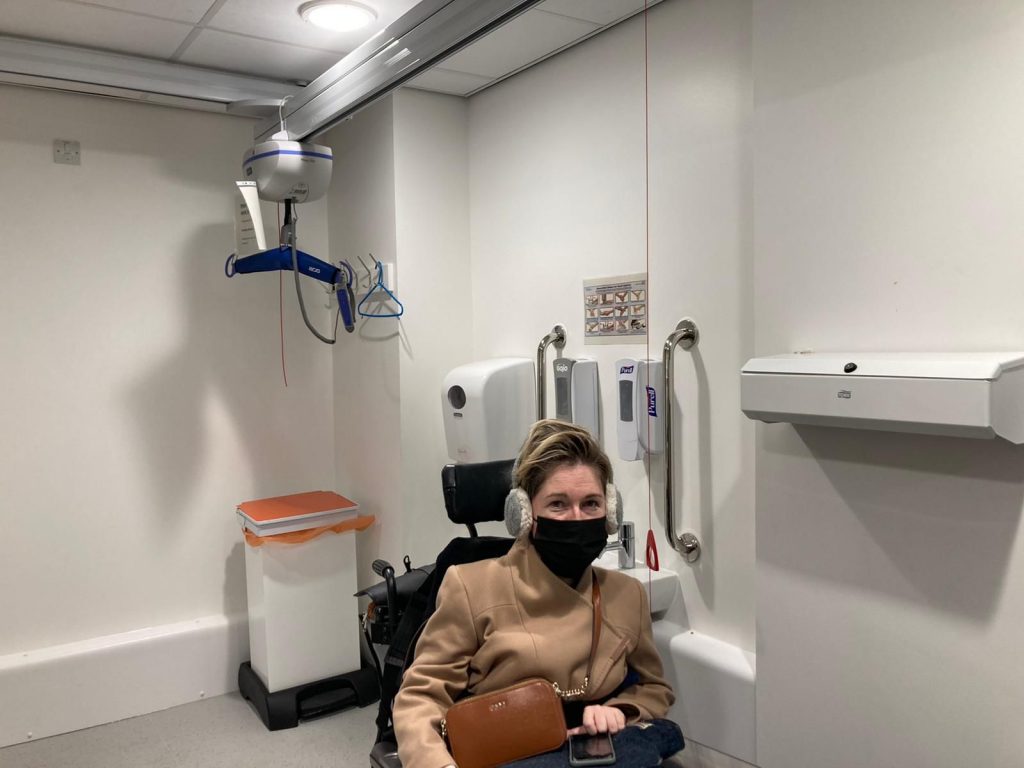
A disabled woman ‘forced to wait 13 hours’ for the toilet at Salford Royal has criticised the hospital for lack of working accessible facilities.
Sarah Rennie has rare medical conditions that means she cannot walk or stand independently and relies on a wheelchair and a team of personal assistants 24-hours a day. Every two weeks, she travels from her hometown in Birmingham to Salford Royal for essential treatment.
The 36-year-old must stay overnight in a hotel prior to attending her appointment and it has been during some of her visits she claims she has been forced to wait hours due to broken facilities and difficult access.
“The procedure I’m having means they have to take blood and it took two or three hours to get blood from me so they said to be really hydrated,” said Sarah after her last visit in February. “They also said to drink loads of caffeine because it will help with spinal headaches after the procedure.
“By 10 o clock, I was bursting for the loo. I was just thinking – how are they going to do a lumber puncture, pressing on my back and spine, with a full bladder?”
In the end, three to four people had to assist Sarah in using a manual hoist and a commode chair so that she could go to the toilet. She said: “I appreciate that a lot of people have to do that every day, but what annoys me is I have other options; I’m able to use the toilet and those choices are taken away from me.

“I have to be [at Salford Royal] from 9am, meaning I must get up at 6am and go to the loo in my hotel room,” she said. “I then drive to the hospital and will be there ‘til about 5pm before driving back to Birmingham. The last few times I can go from 6am until 7pm without the toilet.”
A changing place is a larger disabled access toilet. They contain an electric mobility hoist, designed to safely pick up and place a user onto the toilet or an adult-sized changing bench. The size means one or more carers can assist when needed.
Karen Hoe, a spokesperson from Changing Places UK said: “These facilities are of the utmost importance to allow over 250,000 access to an accessible toilet that meets their needs – without them they simply cannot leave the house and are totally isolated not being able to use a toilet when needed.”
Sarah emphasised the importance of changing places and how a lack of them affects her.
“When you don’t have these facilities, it’s perfectly common for me to go out and not be able to use the toilet for the whole day,” she said. She went on to say she’ll sometimes wait 12 to 15 hours without being able to use the loo.
Before travelling anywhere, Sarah uses the map on Changing Places UK to locate the nearest toilets. She said: “I looked on the Changing Places map and there was not one at the hospital. I double-checked because sometimes venues forget to register them. So, I went on the hospital’s website and there was no reference there either.”
Sarah went on to contact the hospital publicly about her concerns. She said: “I was really surprised to get replies from medical professionals and the hospital itself saying “we’ve got one”, so I was chuffed to bits.” The hospital confirmed that one had been installed last year and provided its location within the building.
Despite the relief that there was a changing place available, Sarah was later informed by her nurse the hoist was broken and required repairs. According to staff, this had been the case for several weeks. She went on to raise this once again with the hospital’s social media team, who forwarded the report onto estates. The broken hoist was initially reported on the 8th of February but is still yet to be fixed.
Karen from Changing Places UK has been in correspondence with the hospital since the problems arose. “We often hear about scenarios, like this one at the hospital that we know nothing about the facility there, it’s not registered, signposted, etc so no one knows about it – including the staff too!”, she said.
Sarah was unafraid to express her frustration about the circumstances. She said: “I feel a bit cross really…you would expect a hospital to understand the importance of going to the toilet; the importance of safely transporting someone from their chair and not being carried.”
Dr Pete Turkington, Medical Director and Chief Officer at Salford Royal has since responded to the enquiries. He said: “We appreciate that this is a really important facility for Sarah and we are really sorry it’s not currently available to her…we are engaging with specialist contractors to try and get the hoist fixed as soon as possible so that Sarah and other patients and visitors can use this changing room. An alternative type of hoist is available in a nearby department but we will absolutely prioritise getting the hoist in the changing room back into use as soon as we can. We are also taking steps to have this changing room added to the Changing Places website.”
The changing place facility at the hospital is one of just four registered in Salford. Karen said: “Venues are required to register with us for many reasons; firstly, so we can check that the facility meets the requirements against the standards and can be endorsed as a CPT and therefor carry the logo of accreditation. Secondly, we can then register it and activate it on the national map so that our community know where to find them when they need them, and can plan their days out, visits etc.”
Karen said that every venue will be recommended to sign up to the service warranty and maintenance contracts when a reputable supplier installs a changing place. She said: “We don’t own the changing places facilities, the venues do, so its therefore their responsibilities to ensure all the necessary servicing and warranties are in place and adhered to.”
Sarah wanted to raise awareness about why changing places are so necessary for people like her.
She added: “Changing Places are hugely important for me to be able to go to the toilet when I need to, just like any other human being…I hope that anyone who reads about these sorts of things might go away and think, ‘What’s it like for people in my workplace?’”
Sarah hopes that the hospital will consider adding another changing place in the near future. She said: “I would also say a hospital of that size, with the amount of disabled people or people undergoing surgery that requires them to temporarily use these facilities; the numbers are going to be so disproportionately high.”
Currently there are 1,690 accessible toilets registered with Changing Places UK. Equipment required to install one can cost an estimated £12,000 – £17,000 including VAT. Guidance provided under the British Standard 8300 recommends that changing places should be included in larger buildings, with hospitals being a key contender. (Credit: https://www.changing-places.org/pages/view/media-interest)















Recent Comments